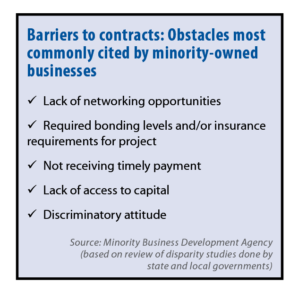By Tim Anderson
No state in the Midwest requires that a certain percentage of contracts be given to minority- or women-owned businesses. (Outside the region, Connecticut requires that 6.25 percent of the value of state and local government contracts go to companies owned by women, minorities or disabled individuals.) However, at least three states have specific goals set in statute: Illinois, Ohio and Wisconsin.

Illinois’ “aspirational goal” is to have 20 percent of the value of state contracts awarded to businesses owned by minorities (11 percent), women (7 percent) and people with disabilities (2 percent). Each agency and university must file a compliance plan that outlines goals for awarding contracts to businesses owned by individuals in these demographic groups. The plans are reviewed and approved by the Illinois Business Enterprise Program Council.
Ohio’s set-aside goal is 15 percent for minority-owned enterprises. In Wisconsin, meanwhile, the Department of Administration is directed to work toward two goals: 5 percent of the total value of contracts and subcontracts going to minority businesses, and 1 percent to disabled veterans.
One common strategy among most states is to require disparity studies that review statistical trends and help agencies meet various statutory goals or requirements. In addition, nearly every state in the Midwest provides some type of targeted technical assistance and administers a certification program for minority- and female-owned businesses.
Under Indiana law, the Department of Administration must operate a Division of Supplier Diversity to “promote, monitor and enforce the standards for certification of minority and women’s business enterprises.” Indiana also has a Governor’s Commission on Minority and Women’s Business Enterprises. Created by statute, and composed of representatives from every region of Indiana, this commission works with certified minority- and female-owned enterprises and sets goals for participation by these businesses in state-funded contracts and subcontracts.
Wisconsin has three separate certification programs: one for women, a second for minorities, and a third for disabled veterans. Under state law, any certified minority business enterprise may be awarded a state contract if its bid is no more than 5 percent higher than the apparent low bid or no more than 5 percent lower than the most advantageous offer. This preference does not extend to women-owned businesses. It is extended, however, to businesses owned by disabled veterans.
In recent years, Minnesota has ramped up strategies to close the gap between the state’s total number of minority- and women-owned businesses and the percentage of state contracts awarded to them. Under current administrative rules, “a certified targeted group, economically disadvantaged area or veteran-owned small business may be awarded up to a 6 percent preference in the amount offered over the lowest responsible offer from another vendor.”
For large projects, Minnesota establishes subcontracting goals for the contractors to hire these “targeted” businesses. And under Minnesota’s Equity Select program, state agencies can directly select certified diverse businesses on any purchase or contract up to $25,000, without competitive bidding. In Nebraska, preference is given to contract bidders from economically distressed areas that have been designated by the state as enterprise zones.
